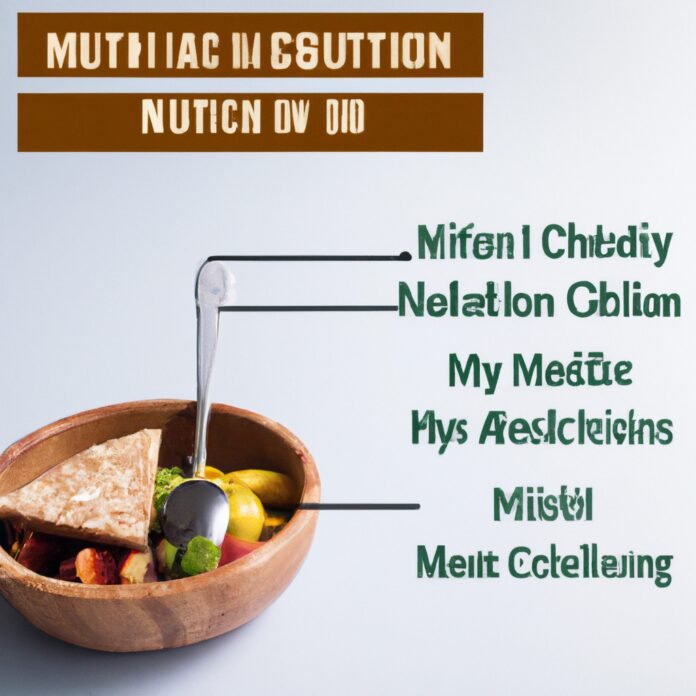As parents, we all want to give our children the best of everything— especially when it comes to nutrition. With the ongoing influx of information out there on what constitutes a “balanced diet”, it can be difficult to separate fact from fiction. To provide you with some much needed clarity, this article will explore the most commonly believed myths about childhood nutrition and dispel misconceptions for a healthy and balanced diet.
1. Kids Need More Than Milk and Cookies: Debunking Nutritional Myths
Most adults agree that kids need a balanced diet for healthy growth and development. But is a glass of milk and a handful of cookies really all kids need? Unfortunately, this widespread notion is far from true and perpetuates pervasive nutritional myths that don’t reflect reality.
Nutrition experts recommend that kids’ diets consist of whole foods. Whole foods are less processed and closer to their natural state. These include fresh fruits, vegetables, grains, legumes, lean proteins, nuts, and low-fat dairy. Balance is important too, as these foods provide complex carbohydrates, essential fatty acids, vitamins, minerals, and fiber. An occasional treat of sugary snacks and drinks can be enjoyed if they’re offered in moderation.
Parents should also keep in mind that toddlers and school-age children have higher nutritional needs than adults. Kids require more of certain nutrients—like calcium, vitamin D, and iron—during these formative years. Low levels of these nutrients can lead to serious problems such as anemia and malnutrition. Here’s a simple list of foods that can provide the extra boost your young one needs:
- Nuts such as walnuts, almonds, and cashews
- Green leafy vegetables
- Low-fat dairy like yogurt, cheese, and milk
- Whole grains like quinoa, brown rice, and oats
- Fruits like oranges and apples
- Lean meats like chicken breast and pork loin
- Beans and legumes like black beans and chickpeas
It’s also important to add variety to your child’s plate. Introducing a mix of colors and textures encourages kids to try new things, and could even spark an interest in healthy cooking and nutrition. So the next time your little one reaches for a cookie, substitute it with a colorful concoction of these power-packed foods to kick nutritional myths to the curb!
2. Don’t Believe the Hype: Clearing Up Misconceptions about Childhood Nutrition
It’s easy to believe what you hear, especially when it comes to children’s nutrition. Unfortunately, the hype surrounding eating for kids is often disinformation. Let’s clear up some of the more common myths, so parents can make healthier choices for their children.
- Organic Means More Nutritious. While organically grown food is likely to have fewer pesticides, at the end of the day the nutrition balance between organic and non-organic isn’t vastly different. And organic foods can come at a much steeper price.
- All Sugars are the Same. Not exactly. For instance, fructose is found in fruits and vegetables, and it is digested differently than sucrose, which is found in processed foods. Of course, all sugars should be eaten in moderation and opt for naturally occurring sources when you can.
- Fried Foods are Always Bad. This one’s a little more complicated. In some instances, fried foods aren’t necessarily unhealthy – it’s all about how they’re cooked. Let’s use french fries as an example; if they’re boiled or steamed first, and then fried in heart-healthy oils, then they might still be a nutritious snack.
As you can see, it’s difficult to make recommendations on children’s nutritional needs without knowing context. Before changing up your child’s diet, it’s important to research the facts and remember that one size does not fit all. When in doubt, your child’s doctor or a qualified nutritionist should be the one you turn to for advice.
3. Vitamins, Minerals, and Other Nutrients: Ensuring Balance in Your Child’s Diet
As a parent, it’s important to ensure that your child is getting all the necessary nutrients for healthy development. While you should be providing plenty of fresh fruits and veggies, here are some key vitamins, minerals, and other nutrients your child needs in their diet:
- Vitamins: Vitamins are essential for healthy cell structure and metabolic processes. Vitamins such as A, B, C, and D are important for growth and development.
- Minerals: Minerals like calcium, potassium, sodium, and zinc are needed for core bodily functions like absorption and digestion. Trace minerals like selenium, chromium, and iron are also important.
- Good Fats: Good fats are needed in small amounts to provide energy and support healthy brain and nerve functioning. Healthy fats can come from sources like nuts, fish, and olive oil.
- Fiber: Fiber helps support healthy digestion and regularity – important for an active and healthy lifestyle. Sources of fiber include oats, beans, apples, and other fruits and veggies.
An important part of your child’s diet is balance. Ensuring that your child is getting the right vitamins, minerals, and other nutrients is necessary for health, both physically and mentally. Include a variety of foods in meals in order to supply your child with all of the nutrients they need.
Also, research any foods your child is sensitive to. Many kids have sensitivities and allergies to foods like dairy or peanuts, and it’s important to be aware of these and any other potential allergens to make sure your child’s diet is as healthy as can be.
4. Unhealthy Beliefs: Why Beliefs About Nutrition May Not Match Scientifically Proven Facts
The way that we think and feel about what we eat has a major role in our ability to make healthy decisions, and the beliefs that we have about which foods are best for us can be incorrect. Unhealthy beliefs about nutrition are commonly found, and they can stop us from meeting our nutritional needs even if we are trying to make healthy choices. Here are four unhealthy beliefs about nutrition that can lead to negative consequences.
- Organic Foods are Always Healthier: Many people have the impression that organic foods are better for your health than conventional foods, but this isn’t always the case. While some organic foods may have higher levels of some nutrients, others are nutritionally equivalent to their non-organic counterparts.
- Eating Natural Foods is Always Better Synthetic Foods: While it is important to avoid processed foods when possible and to focus on whole foods, there are some synthetic ingredients that are actually beneficial. For example, many vitamins and minerals are artificially produced in order to provide adequate levels of nutrition.
- Certain Diets will Magically Help with Weight Loss: Many people turn to short-term diet plans in order to lose weight quickly, but these restrictive diets don’t create lasting results. Instead, it’s important to follow a sustainable eating plan that includes a variety of foods. Eating a balanced diet is the only way to ensure that you get all of the nutrition your body needs.
- You Need Supplements to be Healthy: While supplements can provide some benefits, they aren’t always necessary. Eating a balanced diet is the best way to get all the vitamins and minerals you need. If you find that you’re not getting enough of certain nutrients, talk to your doctor about supplementing.
It is important to recognize these unhealthy beliefs so that you can make informed decisions about what you eat. Taking the time to research and understand scientific evidence can help you create a healthy eating plan.
5. Positive Strategies to Promote Healthy Eating Habits in Kids
1. Frame Food as Nourishment: Explain to your child that their body needs nutrients to grow, be healthy and most importantly, play and have fun. Make sure they understand where their food comes from and the importance of well-balanced meals.
2. Get Them Involved in the Meal Prep: Encourage your child to be part of the cooking process. Let them pick out healthy recipes or help you while making a meal. It is also a great way to chat about nutrition and have your child make better food decisions.
3. Always Have Healthy Snacks on Hands: Be sure to keep healthy snacks readily available in your home. Have a fruit bowl in the kitchen or frozen batches of vegetable purees handy. That way, when hunger strikes, your child will tend to snack on something more nutritious rather than something unhealthy.
4. Make Mealtimes Fun and Positive: Create an easy and warm atmosphere for mealtime and make it a fun family affair. Avoid distractions like TV and encourage little conversations between everyone around the table. And don’t forget to make healthy food more appealing by adding colours and shapes to the meal.
Proper nutrition for a child is fundamental to leading a long, healthy and active life. By learning the truth underlying many common myths about childhood nutrition, parents can make more informed food choices that will help their children to thrive. Through understanding the facts and debunking the misconceptions, parents can help ensure their children get the balanced and nutritional diet they need to grow and develop.

